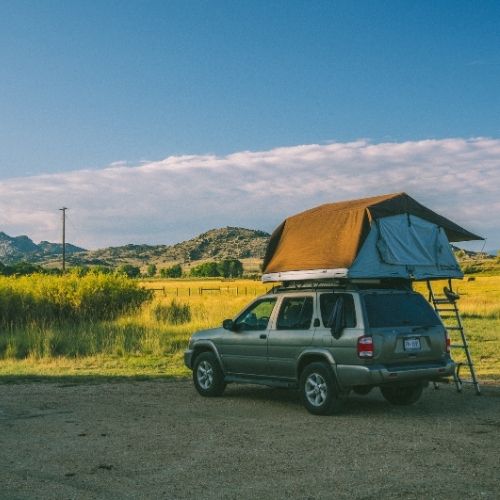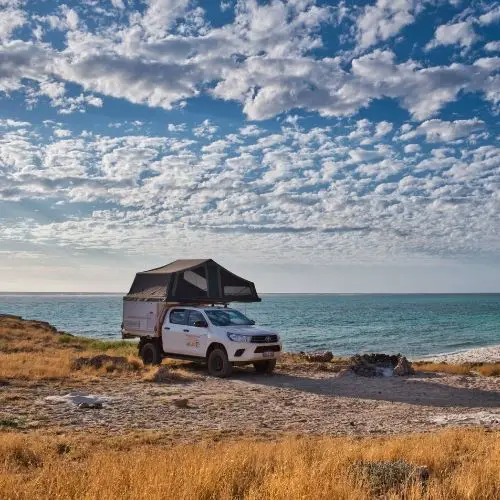We may get commissions for purchases made through links in this post. Thanks for the support! 👍
With roof top tents gaining more popularity each year, a must-have is the security of knowing it’s waterproof. Thankfully enough, roof top tents are generally waterproof, but the thing you really have to look out for is leaks. In this article, we’ll tell you just how waterproof your tent is and just how you can keep it waterproof.
So, How Waterproof Is My Roof Top Tent?

Depending on the quality of your roof top tent, you might have a leaking issue. The best quality for a roof top tent is canvas because it holds the strongest against the elements. When it comes to waterproofing, canvas is your best bet to stay dry.
This doesn’t mean that other materials will always leak, every product is made differently, but the best way to assure your roof top tent is waterproof is with canvas. Another important detail to look out for, especially when buying non-canvas tents, is if the flys touch the tent roof, if they do then you’re probably looking at some leaks.
These are just some of the things you can look out for to make sure you’re picking the most waterproof tent the market has to offer. Now we can look at some of the reasons your roof top tent might be leaking.
Why Your Roof Top Tent Could Be Leaking

So if your tent isn’t exactly being waterproof, there could be many reasons. One of the main reasons some leaking can occur, is through little holes created accidentally when the tent was being sown together, this could’ve been the result of many needle holes in your canvas that water can get through. If this happens, you can use a wax stick to provide a waterproof coating.
Another common cause of tent leaks is mildew, which can cause some partial tears to form. This happens usually when a tent has been put away while wet. This can be especially bad if you live in areas with high humidity, where mildew thrives. If this begins to happen, you can apply a mixture of 30% vinegar and 70% water.
You’ll possibly need to do this a few times so do so if needed, leaving the tent out in the sun could help along with this. If you want to yourself, you can even re-waterproof your own tent to further prevent any leaks.
If you have a leaky roof you should contact the manufacturer of your roof top tent
If you have a leaky roof, you should contact the manufacturer of your roof top tent.
Leaks can be caused by a number of issues. Some of the more common causes are damaged seams or poles. If the seam is not sealed properly, it can create an opening for water to seep in.
In addition, if one pole is bent more than another and that creates tension on the fabric, this will also cause a leak.
- Top 5 Reasons why Yeti Coolers are worth it
- Tarps and Tents: Can You Put a Tarpaulin over a Tent?
- Here is why You need a Tarp under your Camping Tent
How To Waterproof Your Own Roof Top Tent
While canvas is naturally waterproofing, the qualities may start to break down over time. If you find you need to waterproof your roof top tent, the easiest way to do so, is to set up your tent at home, make sure it’s a sunny day out.
Then you want to gently clean the tent by brushing it on the inside and out, after this, get a waterproofing solution (check the owners’ manual to see which solutions are okay.
Then spray the solution evenly over the canvas, creating a coat of it. Once this is done, allow it to dry, and you’re all done. It should be noted that this should be done once a year as soon as you start to notice the natural waterproofing effects of the canvas start to diminish.
Recommended Tents
Still on the hunt for a roof top tent for your vehicle? Here are a couple that we really like.
- TMBK 3 Person Roof Top Tent with Rain Fly Tan Base & Green Rainfly
- Overland Vehicle Systems Nomadic 4 Extended Roof Top Tent with Rain Fly & Black Cover Universal
- Overland Vehicle Systems Nomadic 2 Extended Rooftop Tent RTT Rain Fly & Black Travel Cover Universal
Conclusion
Roof top tents are naturally waterproof, but lower quality tents and the weather can cause leaks over time. Apply your own re-waterproofing solution to prevent this from happening!
You only have to do it once a year, and it keeps your roof top tent completely waterproof so even if you don’t get as much rain or snow for long periods of time like during summer months in some regions around the world where there’s not enough precipitation throughout the day or night you won’t be stuck with an uncomfortable leaky tent when all that wetness infiltrates through cracks between seams before seeping into insulation inside–you know what I’m talking about

![TOP 8 Best Bull Bars For RAM 1500 [And Others]](https://amanandhisgear.com/wp-content/uploads/2020/05/2013-RAm-1500-Bull-Bar-1.jpg)
![Can Camping Chairs Get Wet? [6 Examples]](https://amanandhisgear.com/wp-content/uploads/2020/10/Can-camping-chairs-get-wet_.jpg)
